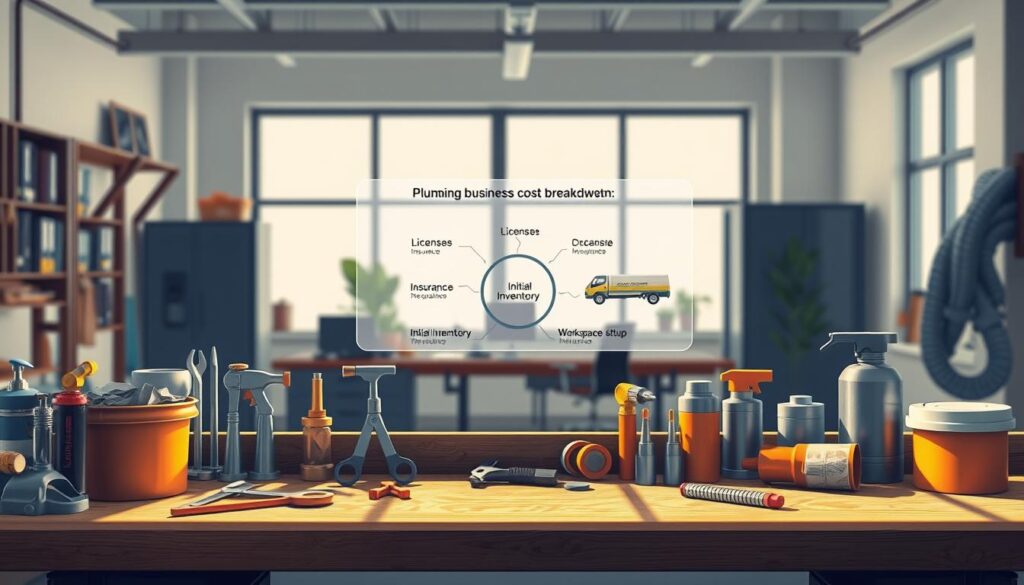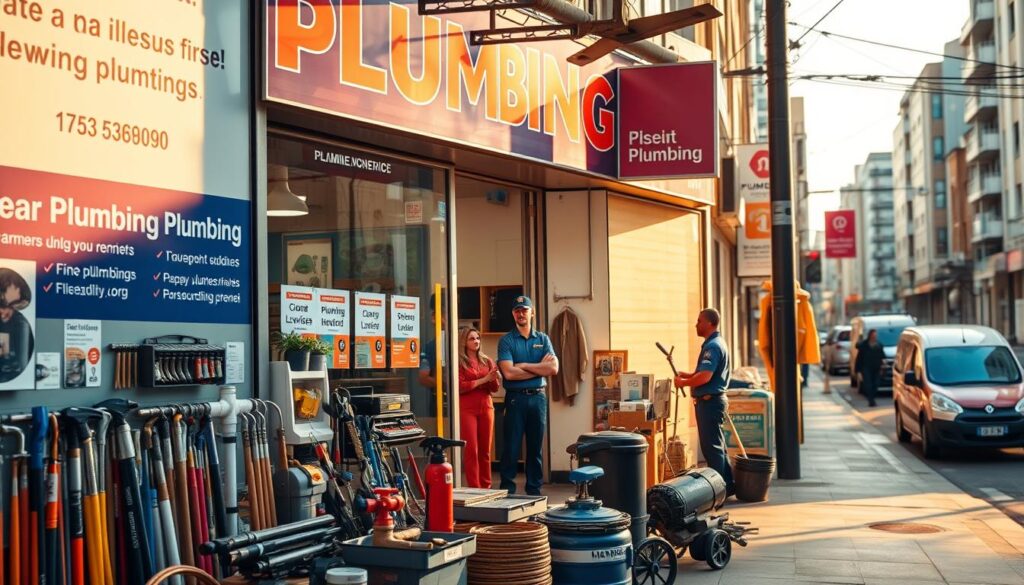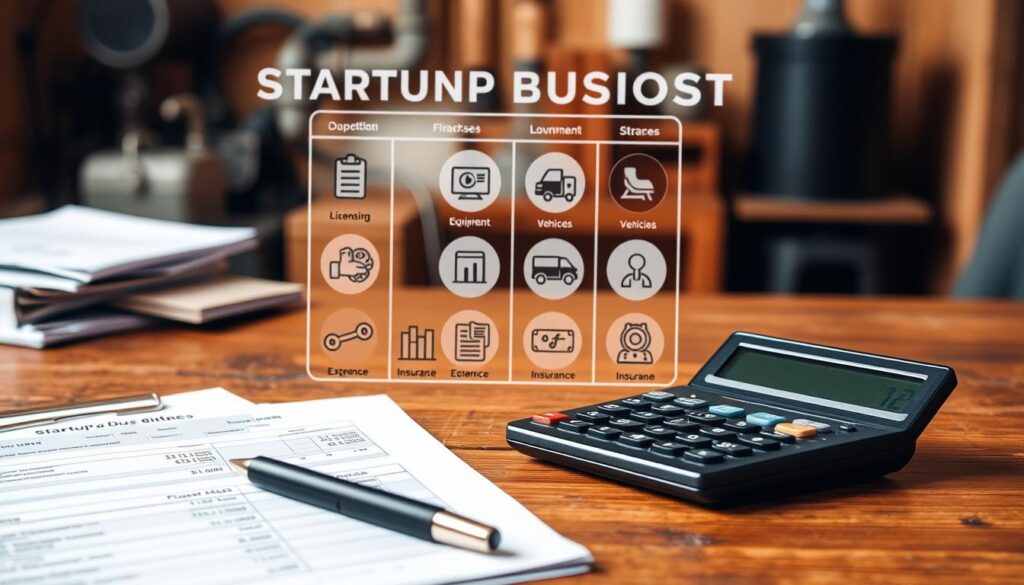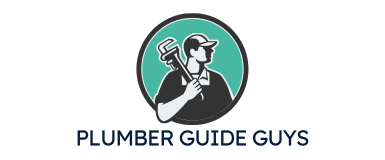Affiliate Disclosure
Plumber Guide Guys is a participant in the Amazon Services LLC Associates Program, an affiliate advertising program designed to provide a means for sites to earn advertising fees by advertising and linking to Amazon.
How Much Does It Cost to Start a Plumbing Business? Did you know the plumbing industry makes over $107 billion a year in the U.S.? Starting a plumbing business can be very profitable. It’s a great chance for entrepreneurs to join a stable and growing field. Knowing the plumbing business startup costs is key for anyone thinking about it.

Exploring the costs to start a plumbing business shows initial investments range from $10,000 to $50,000. The exact cost depends on several factors like your location, the services you offer, and your resources. Your budget will need to cover important costs like licensing, equipment, transportation, and marketing.
Successful plumbing business owners know that good financial planning is the base of a successful business. By understanding the startup costs and planning well, you can succeed in this competitive field.
Key Takeaways
- Plumbing business startup costs range from $10,000 to $50,000
- Initial investments cover licensing, equipment, and marketing expenses
- Location and business scope significantly impact startup costs
- Comprehensive financial planning is essential for success
- The plumbing industry offers substantial revenue
Table of Contents
Understanding Initial Investment Requirements
Starting a plumbing business needs careful financial planning. You must understand the initial costs for plumbers. The average investment varies based on several factors that affect your startup journey.
Your initial investment depends on several key factors. These factors can greatly impact your startup costs:
- Business scale and complexity
- Geographic location
- Range of services offered
- Equipment and tool requirements
- Marketing and operational expenses
Basic Startup Capital Range
Most plumbing entrepreneurs start with an investment of $5,000 to $200,000. Small businesses might start with little money. But, bigger businesses needing many vehicles and employees require a lot of capital.
Factors Affecting Initial Costs
Your startup costs depend on your business’s unique features. Urban areas often need more money than rural areas. Specialized services or advanced technology can also raise costs.
Financial Planning Considerations
Good financial planning is more than just calculating costs. You should:
- Create a detailed business budget
- Secure the right financing
- Build an emergency financial buffer
- Look for cost-effective equipment
- Plan for unexpected expenses
Strategic financial preparation is the foundation of a sustainable plumbing business.
Essential Licensing and Legal Requirements
Starting a plumbing business is a complex journey. You must understand and meet legal and licensing rules in different places. Your success depends on these steps.
Plumbing license costs and financial needs vary by state and local rules. Each area has its own rules for plumbers starting a business.
- State-level licensing requirements typically include:
- Passing a thorough plumbing exam
- Completing a set number of apprenticeship hours
- Showing professional work experience
- Keeping up with certifications
To get your plumbing license, you’ll face several costs. The average cost for a plumbing license is $100 to $500. This depends on where you are and the license type.
When starting a plumbing business, consider these financial needs:
- Exam fees
- License application costs
- Background check expenses
- Business registration fees
- Insurance costs
Your local licensing board will give you the details you need. Spend time learning the exact rules for your city and state. This ensures you follow the law and avoid legal issues.
“Proper licensing is the foundation of a successful and legitimate plumbing business.”
Here’s what to do next: Contact your state’s licensing department, gather all needed documents, and get ready financially for the licensing process.
How Much Does It Cost to Start a Plumbing Business: Complete Breakdown
Starting a plumbing business needs careful financial planning. Your budget will set the stage for your success. Knowing the key expenses helps you plan your financial journey.
Understanding the initial costs is key to starting your plumbing business. We’ll look at the main areas to invest in for your business’s early days.
Equipment and Tools Investment
Your tools are essential for professional plumbing services. The cost for basic and specialized equipment is high:
- Basic hand tools: $1,500 – $2,500
- Power tools and specialized equipment: $2,500 – $4,000
- Diagnostic and measurement instruments: $1,000 – $1,500
Vehicle and Transportation Costs
A reliable vehicle is your mobile office. Plumbers usually spend on:
- Used work van or truck: $20,000 – $35,000
- Initial vehicle setup and branding: $1,500 – $3,000
- Initial fuel and maintenance budget: $2,000 – $3,000
Insurance and Bonding Expenses
Insurance and bonding protect your business:
- General liability insurance: $1,500 – $3,000 annually
- Professional liability coverage: $800 – $2,000 annually
- Business bonding: $500 – $1,500
“Successful plumbing businesses are built on solid financial planning and strategic investments.” – Industry Expert
Your initial investment could be $30,000 to $50,000. This depends on your local market and business size. Smart budgeting and purchasing can make the most of your investment.
Setting Up Your Business Structure
Choosing the right business structure is key for your plumbing business’s costs and success. Your business type affects taxes and how safe your personal assets are.
When starting your plumbing business, pick a legal structure that fits your goals. Common choices for plumbing business owners are:
- Sole Proprietorship: Simple with low startup costs
- Limited Liability Company (LLC): Protects your personal assets
- Partnership: Good for businesses with more than one owner
- Corporation: Offers strong legal protections but is more complex
Each structure has its own costs and legal rules. An LLC is often the best choice for plumbing entrepreneurs. It offers good protection and flexibility. You’ll need to pay $50 to $500 for the initial registration, depending on your state.
Here are the main steps to set up your business:
- Choose a business name
- Register with state authorities
- Get an Employer Identification Number (EIN)
- Open a business bank account
- Get the needed local business licenses
Getting advice from a local business lawyer or accountant can help. They can guide you through the setup process and help save on legal costs.
Essential Equipment and Supply Costs
Starting a plumbing business needs careful planning and the right tools. You must have a wide range of tools for different jobs. This helps manage your startup costs well.
When starting your plumbing business, you’ll need to plan for both basic and specialized equipment. Knowing the essential tools and their costs is key. It helps you make smart choices about your initial investment.
Basic Plumbing Tools Every Professional Needs
- Adjustable wrenches
- Pipe grips
- Pipe cutters
- Hacksaws
- Cordless battery-powered toolset
Specialized Equipment for Advanced Services
For more advanced services, you’ll need to invest in specialized tools. These tools help with complex jobs. They also set your business apart in the competitive plumbing market.
| Equipment Category | Essential Items | Estimated Cost Range |
|---|---|---|
| Diagnostic Tools | Pipe inspection cameras | $500 – $2,000 |
| Installation Equipment | Pipe threading machines | $1,000 – $3,500 |
| Repair Accessories | Valve and fitting sets | $300 – $1,200 |
Inventory Management Systems
Keeping track of your tools is important. Use digital tracking software. It helps monitor your tools, maintenance, and when to replace them.
Pro tip: Invest in quality tools for durability and reliability. They save money in the long run and need less replacement.
Marketing and Advertising Investments

Starting a small plumbing business needs a smart marketing plan. Your ad spending is key to drawing in customers and making your brand known. This is important in the competitive plumbing market.
Digital marketing is a smart choice for your budget. It includes:
- Custom Business Website: Show off your services with a professional online space
- Google Business Profile: Get seen in local searches
- Organic SEO: Boost your search rankings
- Social Media Marketing: Connect with people on Facebook and Instagram
How much to spend on marketing is important. Small plumbing businesses usually spend $500-$2,000 a month. This money goes to:
- Website upkeep and updates
- Digital ads
- Print materials
- Local listings
AI tools can make your marketing budget go further. They help with targeted ads, keeping customers engaged, and saving money. This way, small businesses can compete with big ones.
Pro tip: Keep an eye on your marketing return on investment. This ensures you’re spending on the most effective channels.
Insurance and Legal Protection Expenses
Starting a new plumbing business needs careful financial planning. This is true for insurance and legal protection. It’s key to protect your business from risks for success and stability.
Finding the right insurance for a new plumbing business can be tough. You’ll need several types of coverage to protect your investment.
Types of Required Insurance
- General Liability Insurance
- Workers’ Compensation Insurance
- Commercial Auto Insurance
- Professional Liability Insurance
- Property Insurance
Liability Coverage Costs
The cost of liability coverage changes based on several factors. For your new plumbing business, expect to spend $500 to $3,000 annually for full protection.
“Proper insurance is not an expense, but an investment in your business’s future.” – Professional Business Advisor
Bond Requirements
Most states require plumbing businesses to get a surety bond. These bonds cost between $5,000 to $25,000. They depend on your location and business needs. The bond protects your clients and shows your professionalism.
When planning your new plumbing business’s finances, save money for insurance and bonding. These are vital to avoid big financial losses and give you peace of mind.
Operating Costs and Overhead Expenses

Starting a plumbing business means more than just the initial costs. You’ll face ongoing expenses that can affect your profits. It’s key to understand these costs to keep your business running smoothly.
Fixed costs are predictable and include:
- Monthly rent for office or workshop space
- Utility bills (electricity, water, internet)
- Insurance premiums
- Employee salaries
- Loan repayments
Variable costs change with your business’s activity. They can add up quickly. Some examples are:
- Fuel for service vehicles
- Marketing and advertising expenditures
- Replacement tools and equipment
- Additional supplies and materials
- Continuing education and training
“Effective cost management separates successful plumbing businesses from struggling ones.” – Professional Contractors Association
To cut down on costs, think about these ideas:
- Negotiate discounts on bulk supplies
- Buy fuel-efficient vehicles
- Use digital marketing for better value
Keeping track of your costs is essential. Use accounting software to watch your expenses. Make detailed budgets and look for ways to save without hurting your service quality.
Funding Options and Financial Resources
Starting a plumbing company needs careful financial planning. The cost to start a plumbing business can be between $10,000 and $50,000. Knowing your funding options is key to a successful launch.
Business Loans and Grants
Getting the right financial help is essential for your plumbing business. There are several ways to fund your venture:
- Small Business Administration (SBA) loans
- Traditional bank loans
- Government small business grants
- Local economic development programs
Alternative Financing Solutions
If traditional funding is hard to get, look into other options for your plumbing business:
- Personal savings
- Friends and family investments
- Online lending platforms
- Equipment financing
- Crowdfunding campaigns
Investment Planning Strategies
Build a strong financial plan by:
- Creating a detailed business plan
- Maintaining excellent credit
- Building a financial buffer
- Tracking expenses meticulously
Pro tip: Talk to a financial advisor who knows trade businesses. They can help you get the most funding and build a solid financial base for your plumbing company.
Conclusion
Starting a plumbing business is an exciting venture in a booming industry worth $129.1 billion. Knowing the costs to start a plumbing business requires detailed financial planning and smart investments. Your success depends on thorough preparation, wise budgeting, and a clear vision for your business journey.
When starting, consider more than just buying equipment. Costs include licensing, insurance, marketing, and operational expenses. Professional plumbers who invest in quality tools, training, and marketing strategies are set for growth and profit.
The plumbing industry offers great chances for skilled entrepreneurs. By researching the market, making solid financial plans, and focusing on quality service, you can turn your investment into a successful business. Your dedication to quality and smart financial management will be key to your success.
While starting a plumbing business comes with initial costs, the rewards are worth it. With careful planning and a passion for plumbing, you can create a thriving business that meets community needs and brings personal and professional fulfillment.
FAQ
How much does it typically cost to start a plumbing business?
What are the essential licenses I’ll need to start a plumbing business?
What equipment will I need to start my plumbing business?
How important is insurance for a new plumbing business?
What vehicle expenses should I anticipate?
What marketing budget should I plan for?
How much does it typically cost to start a plumbing business?
What are the essential licenses I’ll need to start a plumbing business?
What equipment will I need to start my plumbing business?
How important is insurance for a new plumbing business?
What vehicle expenses should I anticipate?
What marketing budget should I plan for?
FAQ
How much does it typically cost to start a plumbing business?
Starting a plumbing business can cost between ,000 and 0,000. This depends on your business size, location, and services. A small business might start with less money, while a big commercial one needs more.
What are the essential licenses I’ll need to start a plumbing business?
You’ll need a state plumbing license and local permits. You might also need extra certifications. Licensing costs can be from 0 to 0, with some states asking for exams or more education.
What equipment will I need to start my plumbing business?
You’ll need tools like pipe wrenches, plungers, and drain snakes. The cost can be from ,000 to ,000. It depends on the quality and what you need.
How important is insurance for a new plumbing business?
Insurance is very important and often required. You’ll need general liability, workers’ comp, and vehicle insurance. These protect you from financial risks and help you get contracts.
What vehicle expenses should I anticipate?
You’ll need a reliable van or truck, costing ,000 to ,000. It should carry tools and look professional.
What marketing budget should I plan for?
You’ll need
FAQ
How much does it typically cost to start a plumbing business?
Starting a plumbing business can cost between $5,000 and $200,000. This depends on your business size, location, and services. A small business might start with less money, while a big commercial one needs more.
What are the essential licenses I’ll need to start a plumbing business?
You’ll need a state plumbing license and local permits. You might also need extra certifications. Licensing costs can be from $100 to $500, with some states asking for exams or more education.
What equipment will I need to start my plumbing business?
You’ll need tools like pipe wrenches, plungers, and drain snakes. The cost can be from $2,000 to $10,000. It depends on the quality and what you need.
How important is insurance for a new plumbing business?
Insurance is very important and often required. You’ll need general liability, workers’ comp, and vehicle insurance. These protect you from financial risks and help you get contracts.
What vehicle expenses should I anticipate?
You’ll need a reliable van or truck, costing $20,000 to $50,000. It should carry tools and look professional.
What marketing budget should I plan for?
You’ll need $1,000 to $5,000 for marketing. This includes websites, cards, ads, and digital marketing. Keep some money for ongoing marketing to grow your customer base.
What funding options are available for starting a plumbing business?
You can get small business loans, SBA loans, or financing for equipment. Personal savings and grants are also options. Many use a mix of personal and external funding.
How long does it take to become profitable in a plumbing business?
Plumbing businesses can be profitable in 12-24 months. It depends on your market, marketing, and contracts. Building a good reputation and client base is key.
What ongoing costs should I budget for?
Ongoing costs include insurance, vehicle upkeep, tool replacement, and marketing. You’ll also need to budget for licensing and overheads. Set aside 10-20% of your income for these.
Do I need specialized training beyond my plumbing license?
While not always needed, extra certifications can help. They can be in commercial plumbing, green tech, or repair techniques. They might let you charge more.
,000 to ,000 for marketing. This includes websites, cards, ads, and digital marketing. Keep some money for ongoing marketing to grow your customer base.
What funding options are available for starting a plumbing business?
You can get small business loans, SBA loans, or financing for equipment. Personal savings and grants are also options. Many use a mix of personal and external funding.
How long does it take to become profitable in a plumbing business?
Plumbing businesses can be profitable in 12-24 months. It depends on your market, marketing, and contracts. Building a good reputation and client base is key.
What ongoing costs should I budget for?
Ongoing costs include insurance, vehicle upkeep, tool replacement, and marketing. You’ll also need to budget for licensing and overheads. Set aside 10-20% of your income for these.
Do I need specialized training beyond my plumbing license?
While not always needed, extra certifications can help. They can be in commercial plumbing, green tech, or repair techniques. They might let you charge more.

